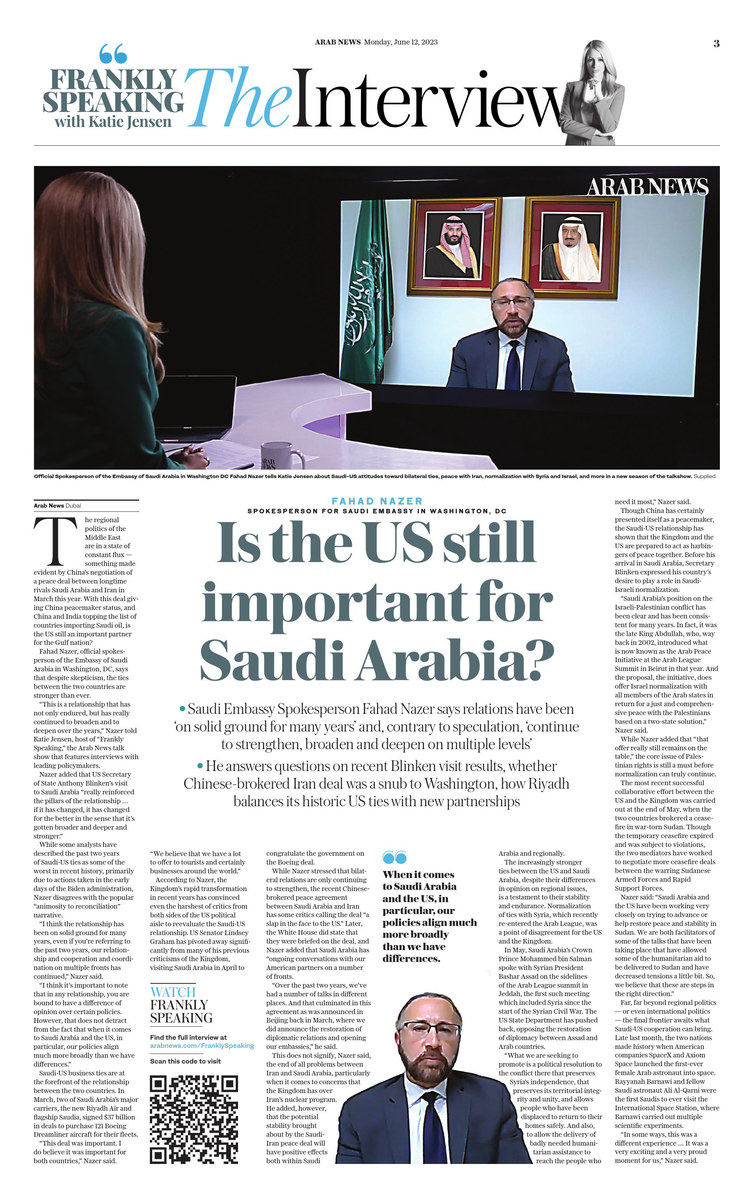DUBAI: The regional politics of the Middle East are in a state of constant flux — something made evident by China’s negotiation of a peace deal between longtime rivals Saudi Arabia and Iran in March this year. With this deal giving China peacemaker status, and China and India topping the list of countries importing Saudi oil, is the US still an important partner for the Gulf nation?
Fahad Nazer, chief spokesman of the Saudi Embassy in Washington, says that despite skepticism, the ties between the two countries are stronger than ever.
“This is a relationship that has not only endured, but has really continued to broaden and to deepen over the years,” Nazer told Katie Jensen, host of “Frankly Speaking,” the Arab News talk show that features interviews with leading policymakers.
Nazer added that US Secretary of State Antony Blinken’s visit to Saudi Arabia “really reinforced the pillars of the relationship … if it has changed, it has changed for the better in the sense that it’s gotten broader and deeper and stronger.
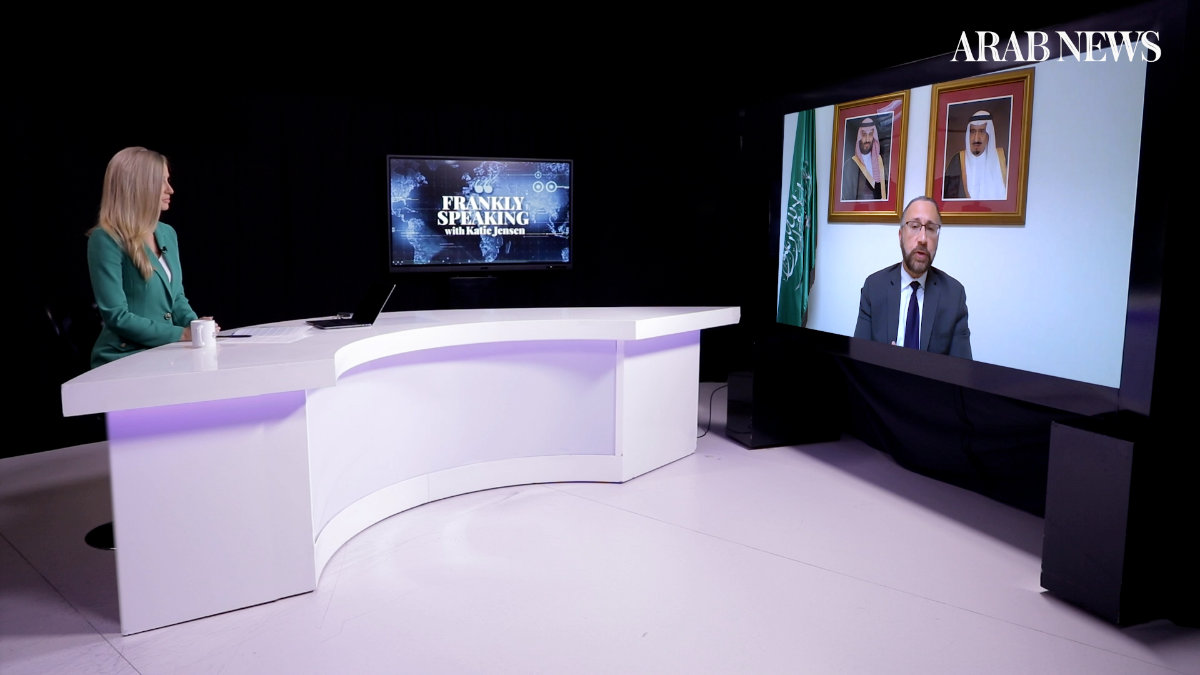
Frankly Speaking host Katie Jensen interviewing Fahad Nazer, spokesman for the Saudi Embassy in Washington, D.C. (Supplied)
“Much like President Biden’s visit back in July these visits have reinforced that the pillars which include political cooperation, security cooperation, military cooperation and trade; at the same time in many ways, they have also outlined the new contours of a more expanded relationship that does include cooperation on a number of new fronts, including cybersecurity, mitigating the impact of climate change, food security and even space exploration,” he said.
While some analysts have described the past two years of Saudi-US ties as some of the worst in recent history, primarily due to actions taken in the early days of the Biden administration, Nazer disagrees with the popular “animosity to reconciliation” narrative.
“I think the relationship has been on solid ground for many years, even if you’re referring to the past two years, our relationship and cooperation and coordination on multiple fronts has continued,” Nazer said, referencing the US and the Kingdom’s regularly joint military exercises, the thousands of Saudis pursuing higher education in the US, and thousands of Americans living in the Kingdom.
“I think it’s important to note that in any relationship, you are bound to have a difference of opinion over certain policies. However, that does not detract from the fact that when it comes to Saudi Arabia and the US, in particular, our policies align much more broadly than we have differences,” he said.
Far more than just military and educational exchange, though, Saudi-US business ties are at the forefront of the relationship between the two countries, says Nazer, who said that the estimated $40 billion in bilateral annual trade value supports 165,000 American jobs.
In March, two of Saudi Arabia’s major carriers, the new Riyadh Air and flagship Saudia, signed $37 billion in deals to purchase 121 Boeing Dreamliner aircraft for their fleets.
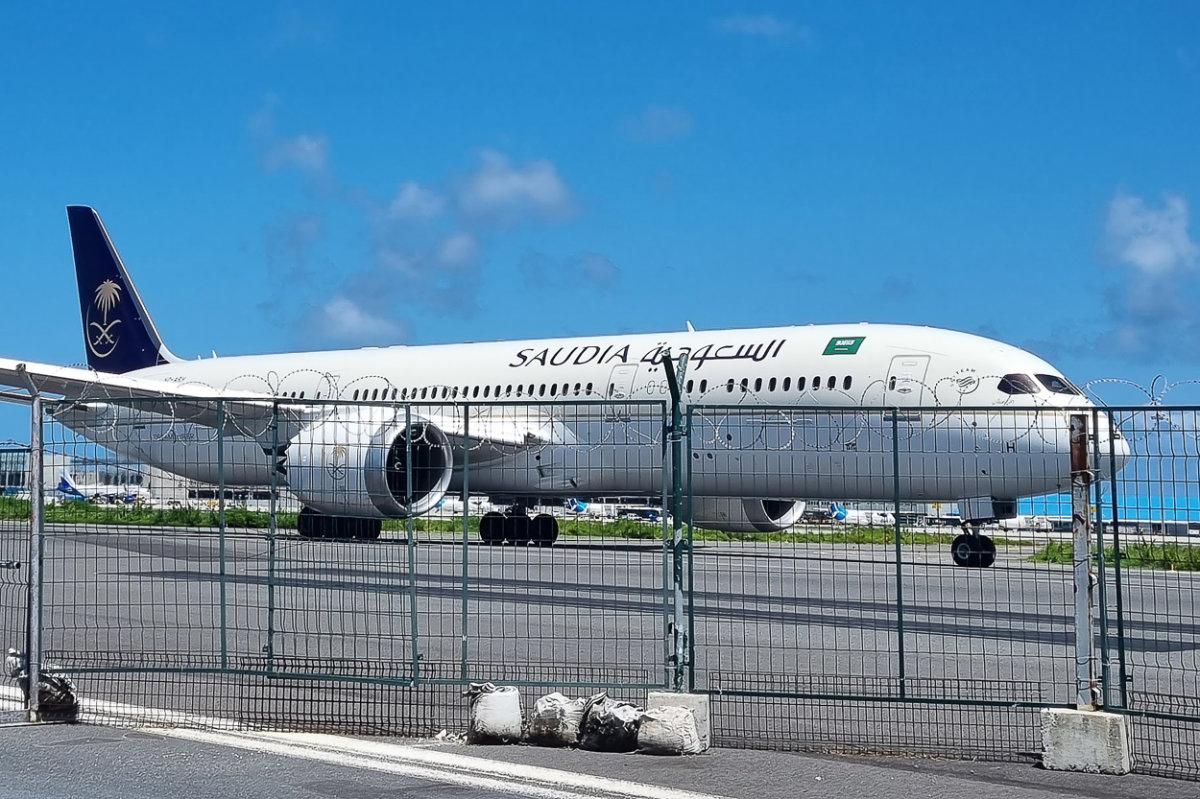
Saudia alone is one of the world's biggest customer of Boeing aircraft, providing tens of thousands of jobs for Americans. (AFP file photo)
“This deal was important. I do believe it was important for both countries. So, one of the many goals that Saudi Arabia has as part of Vision 2030 is to transform the Kingdom into a global logistics hub, but also a global tourism destination. We believe that we have a lot to offer to tourists and certainly businesses around the world,” Nazer said. He added that in addition to making the Kingdom more accessible to foreign tourists, the deal will also create an estimated 110,000 jobs in the US.
According to Nazer, the Kingdom’s rapid transformation in recent years has convinced even the harshest of critics to reevaluate the Saudi-US relationship. US Senator Lindsey Graham has pivoted away significantly from many of his previous criticisms of the Kingdom, visiting Saudi Arabia in April to congratulate the government on the Boeing deal.
“People who visit Saudi Arabia … even seven years ago or five years ago, and come back and visit now, cannot help but notice the dramatic changes that have taken place in the Kingdom. You see it as soon as you land at the airport in Riyadh or Jeddah,” Nazer said, adding that both Republican and Democratic administrations in the US have maintained strong ties with the Kingdom.
“Whether it’s Senator Graham or others, I’ve had the pleasure of actually accompanying a number of American delegations over the past couple of years. And again, I hear the same feedback from business leaders, from civil society leaders, (and) think tank leaders. People are literally amazed at how much the country has changed, how it looks different. It feels different. It’s certainly opened up. And I’m not surprised to hear people come back with a very positive impression, you know, following these visits.”
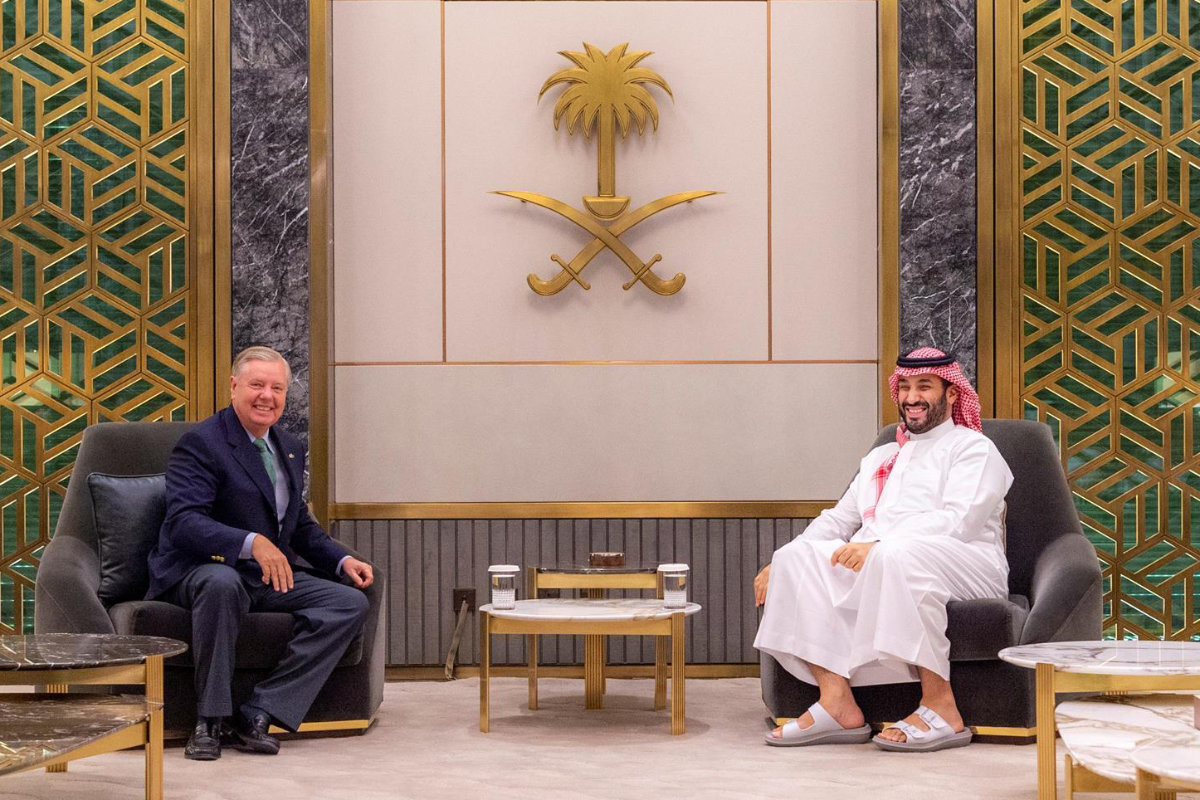
US Senator Lindsey Graham, left, meeting with Saudi Crown Prince Mohammed bin Salman in Jeddah on April 13, 2023. (SPA)
While Nazer stressed that bilateral relations have been robust and are only continuing to strengthen, the recent Chinese-brokered peace agreement between Saudi Arabia and Iran has some critics calling the deal “a slap in the face to the US.” Later, the White House did state that they were briefed on the deal, and Nazer added that Saudi Arabia has “ongoing conversations with our American partners on a number of fronts.
“When it comes to Iran specifically, we have said all along and going back several years at this point, that Iran is obviously our neighbor. They have great potential. They have a predominantly young population. They have a great history and culture. And so, over the past two years, we’ve had a number of talks in different places. And that culminated in this agreement as was announced in Beijing back in March, where we did announce the restoration of diplomatic relations and opening our embassies,” he said.
This does not signify, Nazer said, the end of all problems between Iran and Saudi Arabia, particularly when it comes to concerns that the Kingdom has over Iran’s nuclear program. He added, however, that the potential stability brought about by the Saudi-Iran peace deal will have positive effects both within Saudi Arabia and regionally.
READ MORE: US needs partners to face challenges, it has no better friend than MBS: Washington Times columnist
“Things like transforming the Kingdom into a tourism destination, into a logistics hub, combating climate change, these are challenges that are in many ways global in nature and require the region to enjoy some peace and stability. And so, this is what we’re doing, and through our engagements, whether with Iran or some of our other, you know, regional partners, but also partners in other regions of the world, we believe that we need peace and prosperity,” he said.
The increasingly stronger ties between the US and Saudi Arabia, despite their differences in opinion on regional issues, is a testament to their stability and endurance. Normalization of ties with Syria, which recently re-entered the Arab League and has been restoring relations with a number of Arab countries, was a point of disagreement for the US and the Kingdom.
“Our leadership has concluded correctly that the status quo was simply not sustainable. So, the efforts to isolate Syria and the Syrian government, indefinitely, were not helping stabilize Syria. They were certainly not helping in terms of allowing the provision and the delivery of humanitarian assistance. And they certainly were not helping return the millions of people, who have been displaced and who are now refugees in other countries, return to Syria,” Nazer said.
In May, Saudi Arabia’s Crown Prince Mohammed bin Salman spoke with Syrian President Bashar Assad on the sidelines of the Arab League summit in Jeddah, the first such meeting which included Syria since the start of the Syrian Civil War. The US State Department has pushed back against such normalization, opposing the restoration of diplomacy between Assad and Arab countries.
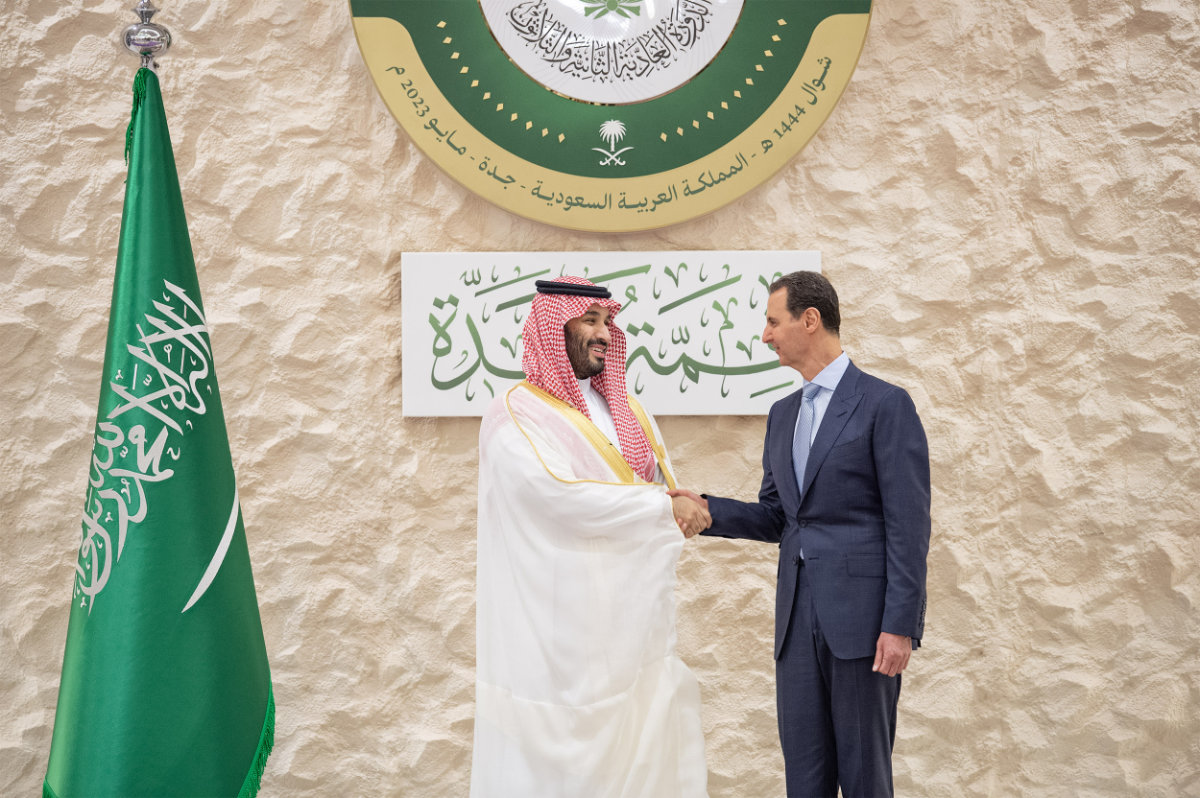
Saudi Crown Prince Mohammed bin Salman (L) meeting with Syria's President Bashar Assad on the sidelines of the Arab Summit meeting in Jeddah on May 19, 2023. (Bandar Al-Jaloud / Saudi Royal Palace)
“What we are seeking to promote is a political resolution to the conflict there that preserves Syria’s independence, that preserves its territorial integrity and unity, and allows people who have been displaced to return to their homes safely. And also, to allow the delivery of badly needed humanitarian assistance to reach the people who need it most,” Nazer said.
Though China has certainly presented itself as a peacemaker, the Saudi-US relationship has shown that the Kingdom and the US are prepared to act as harbingers of peace together. Before his arrival in Saudi Arabia, Secretary Blinken expressed his country’s desire to play a role in Saudi-Israeli normalization.
“Saudi Arabia’s position on the Israeli-Palestinian conflict has been clear and has been consistent for many years. In fact, it was the late King Abdullah, who, way back in 2002, introduced what is now known as the Arab Peace Initiative at the Arab League Summit in Beirut in that year. And the proposal, the initiative, does offer Israel normalization with all members of the Arab states in return for a just and comprehensive peace with the Palestinians based on a two-state solution,” Nazer said.
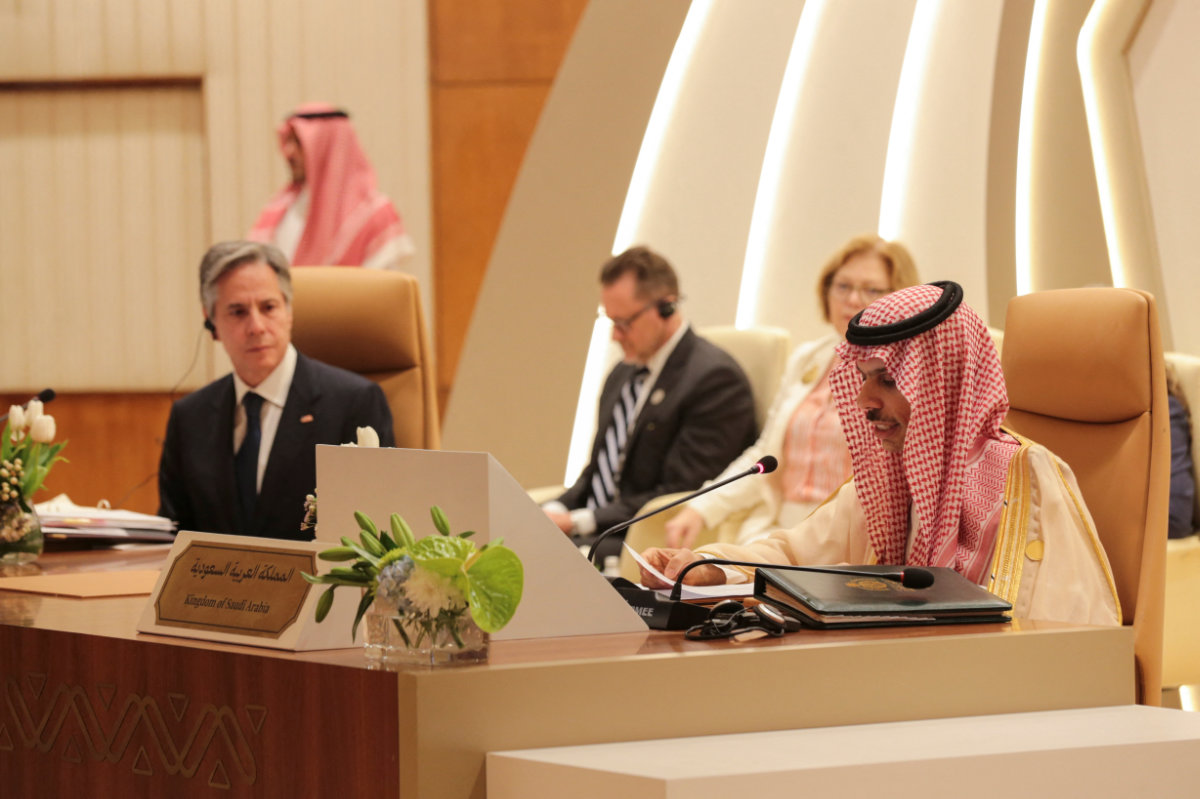
US Secretary of State Antony Blinken, left, attends a joint news conference with Saudi Foreign Minister Faisal Bin Farhan at the Intercontinental Hotel in Riyadh on June 8, 2023. (REUTERS/Pool)
While Nazer added that “that offer really still remains on the table,” the core issue of Palestinian rights is still a must before normalization can truly continue.
The most recent successful collaborative effort between the US and the Kingdom was carried out at the end of May, when the two countries brokered a ceasefire in war-torn Sudan. Though the temporary ceasefire expired and was subject to violations, the two mediators have worked to negotiate more ceasefire deals between the warring Sudanese Armed Forces and Rapid Support Forces.
Nazer said: “Saudi Arabia and the US have been working very closely on trying to advance or help restore peace and stability in Sudan. We are both facilitators of some of the talks that have been taking place that have allowed some of the humanitarian aid to be delivered to Sudan and have decreased tensions a little bit. So, we believe that these are steps in the right direction.”
Far, far beyond regional politics — or even international politics — the final frontier awaits what Saudi-US cooperation can bring. Late last month, the two nations made history when American companies SpaceX and Axiom Space launched the first-ever female Arab astronaut into space. Rayyanah Barnawi and fellow Saudi astronaut Ali Al-Qarni were the first Saudis to ever visit the International Space Station, where Barnawi carried out multiple scientific experiments.
“In some ways, this was a different experience. It was almost an immersive experience for the rest of the Kingdom because the astronauts … were able to share much of their experience with people back in the Kingdom,” Nazer said.
“It was a very exciting and a very proud moment for us.”
